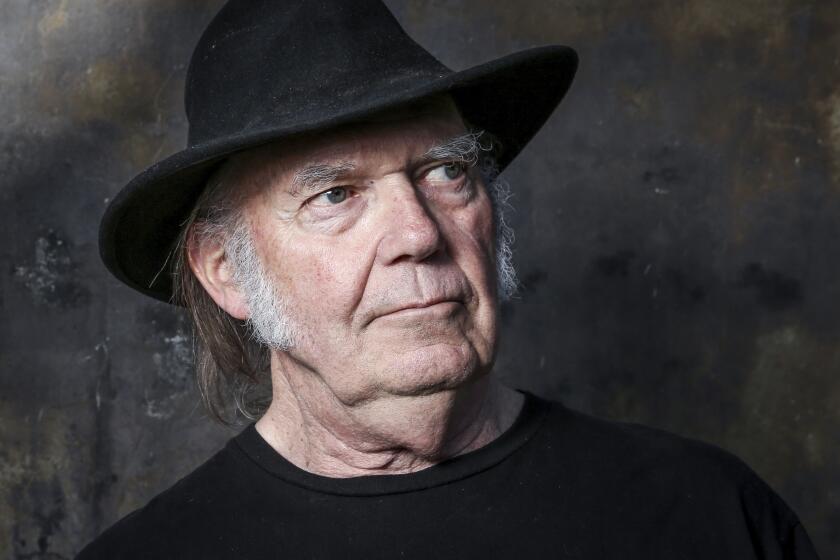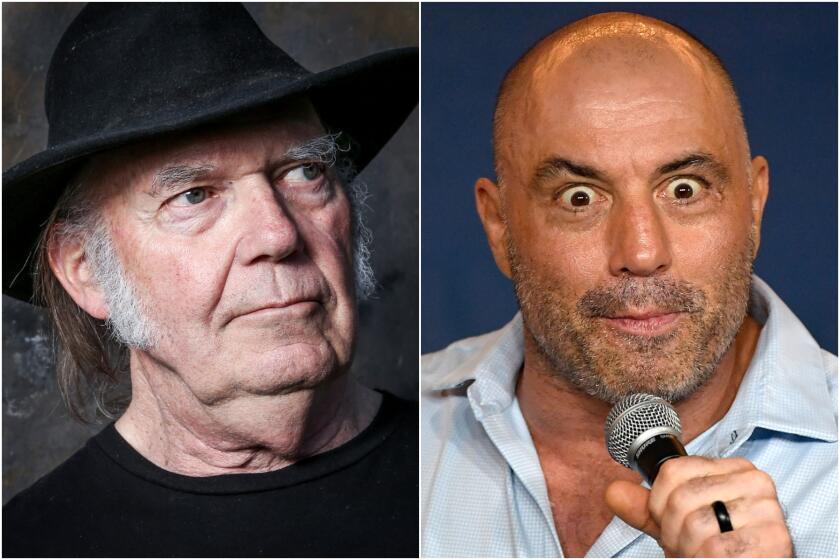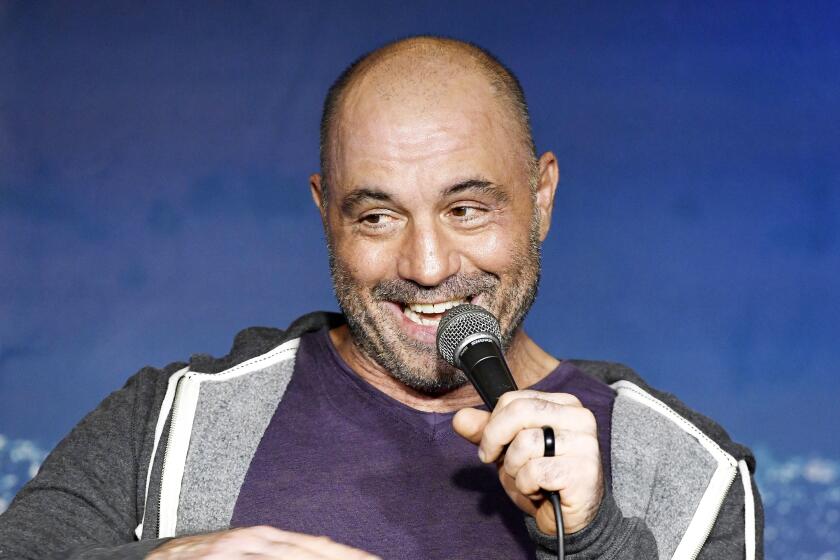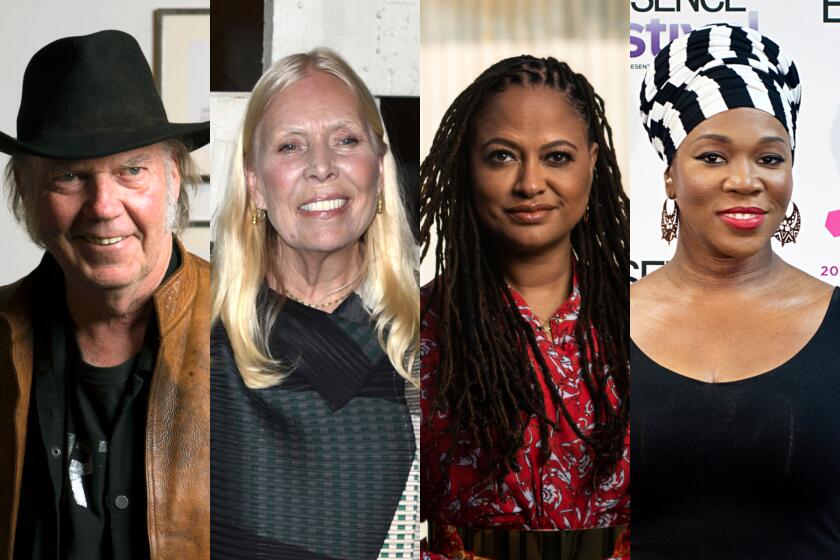Joe Rogan vows to ‘balance things out’ after Spotify misinformation controversy

Rogan has been the center of a firestorm of controversy over how Spotify manages misinformation about COVID-19 on its audio platform.
- Share via
Popular Spotify podcaster Joe Rogan on Sunday night responded to allegations of misinformation on his audio program, pledging to do a better job of balancing different perspectives and putting more time into researching topics.
“I’m going to do my best, but my point of doing this is always just to create interesting conversations, and ones that I hope people enjoy,” Rogan said in a nine-minute video statement released on Spotify and on his Instagram page. “So if I piss you off, I’m sorry and if you enjoyed the podcast, thank you.”
Rogan has been the center of a firestorm of controversy surrounding how Spotify manages misinformation about COVID-19 on its audio platform.
Spotify isn’t new to controversy. Here’s a rundown of the music streamer’s history of feuds with artists and songwriters over royalties, privacy and more.
Recent episodes of “The Joe Rogan Experience” raised alarm among people in the medical community, prompting major artists including Neil Young and Joni Mitchell to pull their music from Spotify to put pressure on the streaming service to take more action.
Rogan said Sunday that he agreed with Spotify’s plans to put a disclaimer on certain podcast episodes that deal with COVID. The podcast host said such disclaimers would inform his audience if guests have opinions contrary to the consensus of experts. He also said he would be open to having guests with differing opinions after the controversial ones.
“I will do my best to try to balance out these more controversial viewpoints with other people’s perspectives, so we can maybe find a better point of view,” Rogan said in the video. “I want to show all kinds of opinions so that we can all figure out what’s going on and not just about COVID, but everything about health, fitness, wellness, the state of the world itself.”
Spotify CEO Daniel Ek responded to Neil Young and others removing their music from the platform over COVID-19 misinformation spread on Joe Rogan’s popular podcast.
Rogan, who hosted Spotify’s most popular podcast last year, said he did not anticipate how successful his podcast would be when he started it.
“It’s a strange responsibility to have this many viewers and listeners,” Rogan said. “It’s very strange and it’s nothing that I prepared for, and it’s nothing that I ever anticipated. I am going to do my best in the future to balance things out.”
He also said he remained a fan of Neil Young and Joni Mitchell.
“No hard feelings towards Neil Young and definitely no hard feelings towards Joni Mitchell,” he said. “I love her too.”
Spotify became the home of Joe Rogan’s podcast in 2020 after the company reached a multiyear licensing deal with Rogan that is said to be worth roughly $100 million.
But the Swedish company has faced mounting public pressure to explain its position on misinformation policies and whether they apply to Rogan, who has faced blowback for questioning COVID-19 medical orthodoxy and for featuring guests who have been banned from other platforms for violating health information guidelines.
Spotify paid millions to lure Joe Rogan but now faces pressure from more than 200 doctors to hold him to account for spreading misinformation about COVID vaccines on his podcast.
Most recently, concerns were raised over Rogan’s December interview with Robert Malone, a scientist and widely criticized mRNA vaccine skeptic who has been banned from tweeting after running afoul of Twitter’s COVID-19 misinformation policies. Malone was one of the speakers at a rally last week in Washington to protest vaccine mandates, where he said of vaccines: “The science is settled. They’re not working.” (Data show vaccines have been highly successful at limiting hospitalizations and deaths due to COVID-19.)
In the three-hour episode, Malone makes a wide variety of medical claims to Rogan about vaccines and other issues, including that “a third of the population” have “become hypnotized” through “mass formation psychosis” as if in Nazi Germany and “totally wrapped up in whatever [Dr. Anthony] Fauci in the mainstream media feeds them.” Fauci is President Biden’s chief medical advisor.
This month, more than 200 people, including medical professionals and academics, sent a Jan. 10 open letter demanding the service “immediately establish a clear and public policy to moderate misinformation on its platform,” likening Rogan’s most controversial episodes to “mass-misinformation events” of “devastating proportions” that provoke “distrust in science and medicine.”
After that letter, Young pulled his music from Spotify and encouraged others to join him.
“I sincerely hope that other artists and record companies will move off the SPOTIFY platform and stop supporting SPOTIFY’s deadly misinformation about COVID,” Young said in a statement posted on his website.
Ava DuVernay, Joni Mitchell and India Arie have abandoned Spotify in the wake of Neil Young’s protest against the streaming platform and podcast host Joe Rogan.
So far, Mitchell, along with Nils Lofgren, guitarist of Bruce Springsteen’s E Street Band, have joined the protest. Best-selling author Brené Brown, who has exclusive podcasts on Spotify, said Jan. 29 that she would not release any new ones until further notice.
Some consumers on Twitter also said they were canceling their Spotify subscriptions in protest.
Spotify Chief Executive Daniel Ek acknowledged in a blog post Sunday that the company hasn’t been transparent about its policies that guide its content, and released information about steps it is taking, including a new labeling system for podcasts related to COVID-19. The company also published its internal content moderation policies that set a relatively high bar for content removal.
The policies forbid any claims that COVID-19 is a hoax, that the vaccines were “designed to cause death,” or that encourage listeners to drink bleach as a treatment or to deliberately catch the coronavirus.
“We know we have a critical role to play in supporting creator expression while balancing it with the safety of our users,” Ek said in his blog post. “In that role, it is important to me that we don’t take on the position of being content censor while also making sure that there are rules in place and consequences for those who violate them.”
More to Read
Inside the business of entertainment
The Wide Shot brings you news, analysis and insights on everything from streaming wars to production — and what it all means for the future.
You may occasionally receive promotional content from the Los Angeles Times.
















